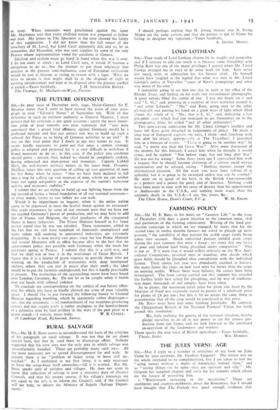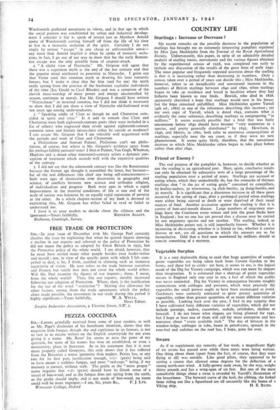THE JULES VERNE AGE
SIR,—May I reply to a number of criticisms of my book on Jules Verne by your reviewer, Mr. Geoffrey Grigson? The review was on the whole intended to be complimentary, but I am taken to task for " using names without a depth of knowledge behind them," and so " saying things—to be open—that are ignorant and silly." Mr. Grigson has supplied chapter and verse for his remarks which allows me the luxury of answering him.
1. " Wordsworth retreating to the mountains." There are snobberies and counter-snobberies about the Romantics, but I should have thought that The Prelude was good enough evidence that Wordsworth preferred mountains to towns, and in that age in which the social pattern was conditioned by urban and industrial develop- ment I consider it fair to speak of retreat just as Matthew Arnold spoke of Wordsworth cutting himself off from the life of his time to live in a monastic seclusion of the spirit. Certainly I do not imply by retreat " escape " in any cheap or unfavourable sense— any more than Arnold implied it when he spoke of monastic seclu- sion; in fact, I go out of my way to show that for the early Roman- tics escape was the only possible form of counter-attack.
2. " A cliché view of Nietzsche.' Mr. Grigson will agree that there was a superman myth at the end of the last century and that the popular mind attributed its paternity to Nietzsche. I point out that Verne used this common myth in drawing his later romantic heroes, but I make it clear that for him (and for me) the myth really sprang from the practice of the freebooter capitalist individuals of the time (Jay Gould to Cecil Rhodes) and was a symptom of the slavish mass-worship of mere power and energy uncontrolled by reason, sentiment or morals. For Mr. Grigson I should have written " Nietzschean " in inverted commas, but I did not think it necessary to show that I did not share a view of Nietzsche old-fashioned even ten years ago among undergraduates.
3. " Speaking oddly of Clare as though he and Chatterton coin- cided in spirit and time." Is it odd to remark that Clare and Chatterton were both eighteenth-century poets (they were included in a list of others) who expressed their revolt against eighteenth-century common sense and literary laissez-faire either by suicide or madness? I can assure Mr. Grigson that I am tolerably well acquainted with the periods and work of Clare and Chatterton.
4. Philistinism and Samuel Palmer. Philistines can't see philis- tinism, of course, but where is Mr. Grigson's evidence apart from his perhaps fallible personal taste? I fmd in Palmer, Van Gogh, Whitman, Hopkins and a dozen other nineteenth-century artists a dynamic con- ception of treatment which accords well with the expansive qualities of the century.
5. I did not say that the nineteenth century was like the Renaissance because the former age thought it resembled the latter, but because— for all the real differences (the chief one being self-consciousness)— both were ages of intoxication over discoveries in geography and science, of conflicts between new science and orthodox religion, of individualism and progress Both were ages in which a rapid improvement in the material conditions of life at one end of the scale of society was balanced by an equally rapid expansion of poverty at the other. As a whole chapter-section of my book is devoted to explaining this, Mr. Grigson has either failed to read or failed to understand me.
I leave it to your readers to decide about the silliness and the































 Previous page
Previous page